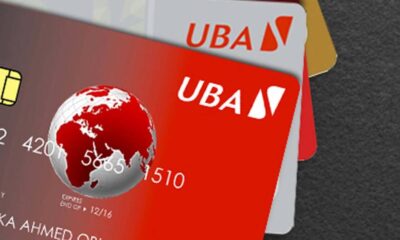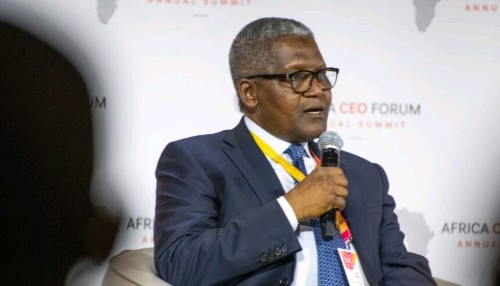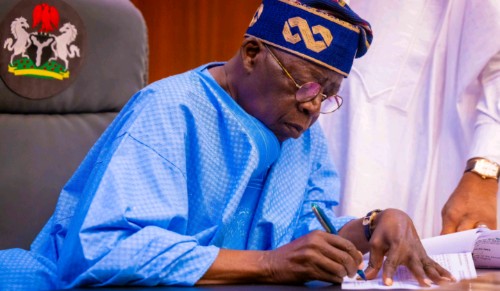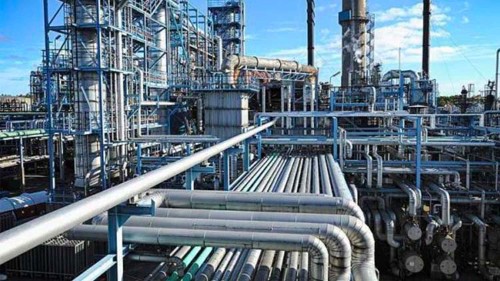The Port Harcourt Refining Company is slated for an upcoming shutdown for a maintenance exercise, which is anticipated to last for 30 days.
While some retailers informed our correspondent that the facility ceased operations on Thursday night, the Nigerian National Petroleum Company Limited stated that the plant was still functional as of Friday.
However, on Friday, fuel retailers in Eleme and Okrika, the communities where the Port Harcourt refinery is located, protested against the planned shutdown. According to them, the refinery coordinator, Bayo Adenrele, had ordered the facility’s shutdown for undisclosed reasons.
The group’s statement was jointly signed by its Board of Trustees Chairman, Sunny Nkpe; the BoT Secretary, Emmanuel Inimgba; the Administrative Secretary and spokesman of PETROAN, Dr. Joseph Obele; the Administrative Chairman, Tekena Ikpaiki; and a board member, Dickson Obelley.
They alleged that certain individuals were attempting to “cripple” the revamped 60,000 barrel-per-day-capacity refinery.
“We, the Host Community Petroleum Bulk Retailers of Port Harcourt Refinery Depot, are compelled to expose the sinister actions of the refinery coordinator, who is acting as an agent of a private refinery. His actions are deliberately designed to cripple the Port Harcourt refinery, denying it crude oil and shutting it down.”
“As we speak, the old Port Harcourt refinery has initiated the process of shutting down on the directives of Engr. Bayo,” the retailers said.
The marketers argued that the shutdown of the refinery would give market dominance to a private refinery, leading to increased fuel prices in Nigeria and further exacerbating the economic hardship faced by the people.
They threatened to hold the coordinator responsible if a fuel crisis erupted after the shutdown of the facility.
“Furthermore, Engr. Bayo’s actions have been marked by a consistent disregard for the rights and interests of the host communities. During the rehabilitation process, he denied our communities their rightful benefits, including contracts, empowerment opportunities, and the sale of scraps,” the statement said.
Instead, it alleged that the coordinator engaged in practices short-changing the host communities while favouring his associates.
“The actions of Engr Bayo have hindered the completion of the CRU of the old refinery plant, and his activities are slowing down efforts to make Area 1, 2, and 3 plants of the new refinery fully operational. We fear that the planned shutdown will also lead to the disengagement of our sons and daughters who are currently working on the O&M of the refinery.
“We wish to make it clear that the host community and critical stakeholders will not fold their arms and allow this refinery to rot away after the government’s efforts to revive it. We will resist, with all vigor, through all available legal means, any push against the functionality of the refinery. We will not stand idly by while he prioritises private interests over the welfare of Nigerians,” the statement read partly.
The group recommended the immediate appointment of a substantive Managing Director for the refinery to facilitate the ongoing rehabilitation works.
“A permanent MD will bring stability and direction, ensuring the refinery’s revival and contributing to the nation’s economic growth,” the statement added.
The group called on the Minister of State for Petroleum Resources (Oil), Heineken Lokpobiri and the Group Chief Executive of the NNPC, Bayo Ojulari, to wade into the matter as soon as possible.
They demanded the removal of the coordinator while calling on the Senate President, Senator Godswill Akpabio, to intervene in the matter.
“We demand swift action to address this sabotage and protect the interests of Nigerians,” the statement concluded.
However, the Chief Corporate Communications Officer of NNPC, Olufemi Soneye, debunked claims of sabotage, saying the maintenance will ensure safe and sustainable operation of the refinery.
Soneye told our correspondent that though the refinery was still working as of Friday, it will undergo a one-month maintenance exercise.
While saying the maintenance will follow global best practices, he added that the NNPC will ensure uninterrupted fuel supply during the period.
“Please be informed that the refinery remains fully operational. However, we are preparing to undertake a scheduled critical safety maintenance exercise aimed at ensuring the continued safe and sustainable operation of the facility.
“This maintenance activity, which will follow global best practices, is expected to last approximately one month. To ensure uninterrupted supply during this period, we have adequate volumes of AGO, kerosene, and other products,” he said.
Recently, the Depot and Petroleum Products Marketers Association of Nigeria said the refineries owned by the Nigerian National Petroleum Company Limited could not optimally produce premium motor spirits but naphtha.
DAPPMAN’s Executive Secretary, Olufemi Adewole, clarified that his members will not go to the Port Harcourt or Warri refineries for petrol because the facilities were producing naphtha, not optimally producing the much-needed petrol.
“The NNPC refineries, both the revamped Port Harcourt and Warri, are not yet optimally producing PMS. They are producing naphtha. Our members will not go to them for now.
“But where we can get the product is Dangote refinery and we are willing to buy from Dangote refinery, but if we don’t get the product from Dangote refinery, the PIA allows us to import, which is what we’ll go for,” Adewole said.
In November 2024, the NNPC said the 60,000 bpd-capacity Port-Harcourt refinery had resumed operations after years of inactivity.
The NNPC said the newly rehabilitated complex of the old Port-Harcourt refinery, which had been revamped and upgraded with modern equipment, was operating at a refining capacity of 70 per cent of its installed capacity.
The company added that diesel and Pour Fuel Oil would be the highest output from the refinery, with a daily capacity of 1.5 million litres and 2.1 million litres, respectively.
This is followed by a daily output of Straight-Run Gasoline (Naphtha) blended into 1.4 million litres of Premium Motor Spirit, 900,000 litres of kerosene, and low-pour fuel oil of 2.1 million litres.
It was stated then that about 200 trucks of petrol would be released into the Nigerian market daily.
The NNPC spokesperson, Soneye, stated this while replying to claims from some quarters that the Port Harcourt refinery was not producing fuel, but blending through Indorama Petrochemicals.
“We are, however, aware of unfounded claims by certain individuals suggesting that the refinery is not producing products. For clarity, the old Port Harcourt Refinery is currently operating at 70 per cent of its installed capacity, with plans to ramp up to 90 per cent.
“The refinery is producing the following daily outputs: Straight-Run Gasoline (Naphtha): Blended into 1.4 million litres of Premium Motor Spirit (petrol); Kerosene: 900,000 litres; Automotive Gas Oil (diesel): 1.5 million litres; Low Pour Fuel Oil: 2.1 million litres; Liquefied Petroleum Gas.
“It is worth noting that the refinery incorporates crack C5, a blending component from our sister company, Indorama Petrochemicals (formerly Eleme Petrochemicals), to produce gasoline that meets required specifications. Blending is a standard practice in refineries globally, as no single unit can produce gasoline that fully complies with any country’s standards without such processes,” Soneye disclosed in November.
He added that the NNPC had made substantial progress on the new Port Harcourt Refinery, which he said would begin operations “soon” without prior announcements.
However, an April report by the Nigerian Midstream and Downstream Petroleum Regulatory Authority showed that the Port Harcourt refinery had been operating below 40 per cent capacity.
Credit: The Punch

 BIG STORY5 days ago
BIG STORY5 days ago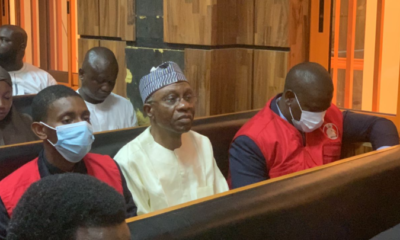
 BIG STORY5 days ago
BIG STORY5 days ago
 BIG STORY4 days ago
BIG STORY4 days ago
 BIG STORY5 days ago
BIG STORY5 days ago
 BIG STORY3 days ago
BIG STORY3 days ago
 BIG STORY4 days ago
BIG STORY4 days ago
 BIG STORY4 days ago
BIG STORY4 days ago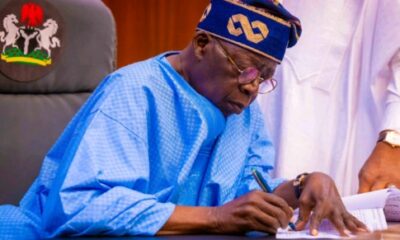
 BIG STORY3 days ago
BIG STORY3 days ago











